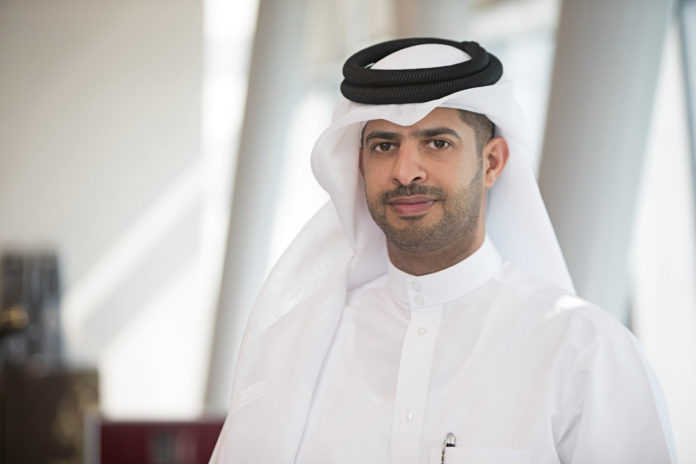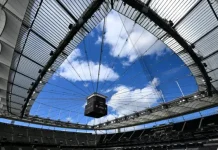(ThriveGlobal) – Nestled in the Middle East and Islamic World is a peninsula on a peninsula, recognized for its blend of ancient Islamic designs integrated into the architecture of modern cities. This Arab nation’s landscape and climate offers a beautiful backdrop for the FIFA World Cup 2022 tournament in the winter, a mega-sporting event that was once invisible. This tournament will inevitably unveil the many beautiful layers that the Arabic region has to offer when game-watchers meet locals and make day trips to the surrounding countries, they will revise their understanding of the region that prior to, was underwritten by misinformation.
Qatar Inspires Wellness, Health, and Sustainability
In a world where success is no longer singular, but rather plural, it has become paramount for larger entities to give back to the community, as part of their global social responsibility. Qatar has used the World Cup as a powerful catalyst to embrace sustainable wellness changes by considering the well-being and the health of the people and the sustainable infrastructure needs of the state to revolutionize wellness.
In 2011, a year after Qatar was awarded the winning bid, ‘National Sports Day’ was inaugurated. This holiday stresses the importance of mental and physical well-being. At the community level, athletic engagements help build social and family cohesion by bringing people together in a friendly and active way. At the individual level, participation in sport increases people’s confidence, social skills, physical health, and mental well-being.
Qatar has embraced evolutionary ways to enter the FIFA World Cup into a new era of experimentation immersed with the formation of new partnerships and the emergence of higher social impact standards. The Supreme Committee for Legacy and Delivery, the driving force behind the FIFA 2022 World Cup, believes that football is a powerful ally to encourage the rising generation to embrace a healthier lifestyle.
A sports’ honor –once fiction –has become an inflection point of a surge in the importance of ‘healthy well-being’ to Qatar’s national identity. As such, Qatar aspires to lead by example to inspire social wellness, healthier lifestyles, and the creation of sustainable stadiums that can be transformed into parks and buildings to serve the community for decades, long after the conclusion of the closing ceremonies and victory celebrations.
I spoke with CEO, FIFA World Cup Qatar 2022, Nasser Al-Khater to receive his insight on how the tournament has become a catalyst for sustainably transforming the well-being of the society and the nation.
Q. In 2011, Qatar announced the creation of National Sports Day. Since then, sports in Qatar has supported both the human and economic development of the country. Can you tell me how your with FIFA World Cup 2022 supports the human well-being aspect.
A. In 2009 Qatar announced it was bidding to host the world’s biggest single sport event, the FIFA World Cup 2022. A core principle of our bid was to ensure the tournament left a lasting human, economic, social and environmental legacy for the country and the region and support the realisation of Qatar’s ambitious National Vision 2030. Qatar is now ten years down the road on its journey to hosting the first FIFA World Cup in the Arab world and has already reaped the rewards of this tournament for local and regional communities and will continue to do so.
“Our mission to start using the FIFA World Cup to support communities and promote healthier lifestyles actually started during our bidding days.”
Al-Khater
When we launched the initial phase of our Generation Amazing programme in 2009. Generation Amazing was founded with the aim of harnessing the power of football to create positive, lasting change in communities in Qatar and across the globe and over the last decade has impacted dozens of communities and thousands of people from every walk of life.
Generation Amazing promotes three pillars through its initiatives and programmes: a healthy generation, a green generation and an inclusive generation. Since the programme’s inception, young people from across Qatar, the region, and the world have learned the importance of maintaining a healthy lifestyle. To date, Generation Amazing has reached 500,000 and aims to reach one million by the time the last ball has been kicked in 2022.
The FIFA World Cup Qatar 2022 will also leave behind some world-class sporting infrastructure that will be used for generations to come, encouraging greater participation in sports and enabling the future hosting of leading sporting events in Qatar. All eight stadiums and their surrounding precincts will be repurposed into spaces that will continue to benefit the local community post-2022, including recreational indoor and outdoor areas for members of the community to practice a variety of sports.
Qatar’s hosting of sporting events over the years and its vision of hosting the first FIFA World Cup in the Arab world has also inspired the entire population and led to a greater interest in sports. The local community are increasingly active on a day-to-day basis as excitement builds ahead of the tournament. This local and regional excitement will only grow the closer we get to kick off on 21 November 2022 and become even more inclusive as we get more and more people involved in the event’s staging.
Q. Sustainability is a key factor in FIFA World Cup 2022. We spoke on the well-being at the human capital level, but in what way has the making of it advanced the well-being of the country?
A. Another of Qatar’s key bid promises was to host the most sustainable FIFA World Cup ever. Many people think about environmental issues when they hear the word sustainability, but the promises made in our bid went far beyond our pledge to deliver a carbon neutral FIFA World Cup, touching on five important pillars – human, economic, social, environmental and governance.
As well as facilitating the development of tournament specific infrastructure, hosting 2022 has accelerated progress on several nation-wide projects including the metro, new airport, and expanded road networks – all of which are part of Qatar’s urban development plan that was set before the decision to bid for 2022 and that forms part of the National Vision 2030.
The tournament is also helping increase tourism and business opportunities for the local and regional markets, and supporting the development of the sports and mega-events industry both in Qatar and the Arab world. However, one of the most important sustainable human development areas has been workers’ welfare, and the reforms we have seen in recent years bear witness to the progress made in this regard.
Qatar’s hosting of the FIFA World Cup has been used as a catalyst to accelerate some far reaching reforms that would not have been possible in such a short space of time had the tournament not been awarded to us in 2010. After years of focus on workers’ welfare reform from the State, Qatar is a better place to work, no matter what line of work you are in and where you are from, and has the legislation to support the various industries that are helping deliver a FIFA World Cup and develop a modern country.
We realise our workers’ welfare journey is far from over though and there are still improvements that need to be made. Qatar as a country is aiming for sustainable long-term change though, change that will last long after the tournament has finished, and a reform programme that other countries can look at and implement themselves, raising standards across the region and the world.
Q. In what ways have FIFA World Cup 2022 been able to promote a healthy lifestyle outside of Qatar?
A. Through our flagship CSR programme, Generation Amazing, the FIFA World Cup Qatar 2022 has been used as a catalyst to drive positive change and increase health awareness and social development around the world – and we still have three years to keep driving those changes before kick-off in 2022.
“Generation Amazing operates across eight countries including Qatar, Lebanon, Nepal, Jordan, India, Oman, Pakistan and the Philippines. To date it has directly and indirectly reached over 500,000 beneficiaries around the world and by 2022, aims to impact the lives of one million people.”
Al-Khater
Qatar also hosts over 90 sporting events a year, works with various global sporting bodies to help raise awareness of various sports and has promoted the FIFA World Cup 2022 at most global sporting events since the tournament was awarded to us in 2010, promoting the benefits of an active lifestyle whilst promoting the unique aspects of Qatar’s tournaments to global fans.
Q. Unity is a heavy value the Supreme Committee for Delivery & Legacy places weight on. How can you ensure tolerance and respect is met by and for all people given the tournament is taking place in a conservative region, where a mega sporting event has not happened in recent history? Have these variables created any opportunities for Qatar?
A. Qatar has a long history of hosting major international sporting events – from the Asian Games in 2006 to the more recent IAAF World Athletics Championships, 24th Arabian Gulf Cup, and FIFA Club World Cup Qatar 2019. In addition, we host over 90 annual sporting events, such as the Qatar Exxon Mobil Tennis Open and the Qatar MotoGP.
Importantly, Qatar separates politics and sport. Everyone is welcome to come to Doha – as we saw most recently with the Arabian Gulf Cup and FIFA Club World Cup, where players and fans from across the region visited the country to enjoy the action on the pitch as well as Qatar as a host country. Throughout the tournaments, we witnessed a high level of tolerance and mutual respect between all fans and players from every walk of life. As a result of the hospitable and welcoming atmosphere here in Doha, everyone had a great experience.
Of course, the FIFA World Cup will be on a different scale, and will be the first mega sporting-event of its size in the region.
Q. How can sports be used to improve international relations?
A. Football has the power to unite where politics divides more than any other sport and is able to transcend politics and build bridges of understanding between people and cultures. Sport is elevated from conflict, and the FIFA World Cup Qatar 2022 will remain a platform to join people together, regardless of politics.
“The influx of fans that will visit the region in 2022 will present us with an opportunity to introduce them to Arab culture and traditions, and project a true image of the Arab world as a peaceful and hospitable region, contrary to misconception.”
Al-Khater
From an operational level, sports opens up the door for cooperation through a number of avenues. For example, hosting the FIFA World Cup has given us the opportunity to work more closely with local communities and their various leaders and representatives.
From an economic perspective, the majority of the stadiums we are building for 2022 are being delivered by joint ventures between companies from Qatar, Asia and from around the world. These multibillion riyal projects are contributing to Qatar’s economic ties with nations all around the world, facilitating further opportunities for harmonious collaboration between them, and promoting the exchange of knowledge and expertise.
Security for the World Cup has also been an avenue through which Qatar has expanded its international relations – as we established partnerships with the world’s leading organisations such as Interpol, Council of Europe, UK Home Office, French Gendarmerie, and many more.
Q. In three words, describe FIFA 2022
A. Innovative. Compact. Unique.













